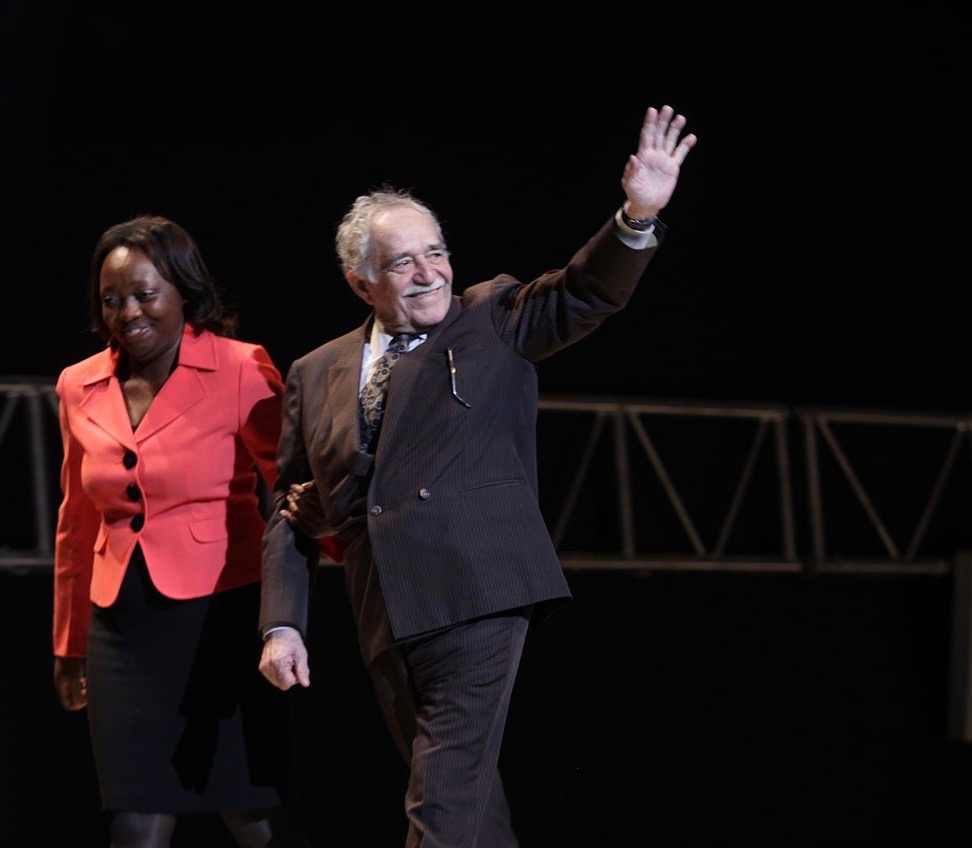Latin America is a country
Gabriel Garcia Marquez wanted to counter the notion that everything in Latin America can be understood only through Euro-American lenses.

Gabriel Garcia Marquez, accompanied by Paula Marcela Moreno Zapata, the first Afrocolombiana to serve as a Cabinet minister in Colombia's government, to a prize giving in Guadalajara, Mexico in 2009. Image: Wiki Commons.
Nobel laureate Gabriel García Márquez–known affectionately as Gabo to his readers–died in Mexico City. The Colombian novelist wrote the famous book ‘A 100 years of solitude’ and is remembered as the father of magical realism, a literary genre in which everyday scenes and magical acts merge. A prolific writer that has been compared to William Faulkner, his celebrated novel is considered as important as Miguel de Cervantes’‘Don Quixote.’
García Márquez might not have appreciated that comparison, even if he himself was a Faulkner’s fan. A speech he delivered in 1995–called Latin America exists–exposes Gabo’s life commitment to fighting cultural, political or social forms of neocolonialism. Or even more, to counter that everything in Latin America, or the world of the Caribbean, can not be understood through European or North American lenses. He said:
About the Caribbean, I think its area is not very well determined, because it should not be geographic but cultural. It should start at the South of the United States and extend until the north of Brazil. Central America, that we assume Pacific, is really not and its culture is Caribbean. This legitimate claim would have at least the advantage that Faulkner and all the greatest writers of the south of the United States would make part of magical realism. Also, around the 1940’s, Giovanni Papini declared that Latin America had not provided anything to humanity, not even a saint, as if that was not good enough. He was wrong, because we did have Santa Rosa de Lima, but he didn’t count her, maybe because she was a woman. His assertion illustrated precisely the idea that Europeans have always shared about us: that all that is not done the way they do it is a mistake, and they make everything to correct it, their way, as the United States does. Simón Bolívar, desperate to hear advises and impositions, demanded one day: “Let us make our own Middle Ages.”
Gabo finished that 1995 speech condemning the privatization of education, and stating that despite being “battered and scattered, still unfinished and always looking for an ethical life, Latin America exists.”
In the coming weeks and months, Gabo’s work should be explained beyond the comparisons to William Faulkner or Cervantes. His worlds not only challenged poetry, but demanded political and social change. Gabo’s writing style is not separated to his political convictions, because he knew how to use prose or poetry to critique Washington’s policies on The War on Drugs, the CIA intervention in Chile in 1973 to the overthrow President Allende, or to challenge mainstream media (both in the US and in Latin America) of Hugo Chavez as Latin America’s worse threat.
Gabo’s family has decided that he will have a private funeral, but there will be a public tribute in Mexico City tonight with the presence of the Colombian and Mexican presidents. So, it is Latin America’s right-wing presidents that will say goodbye to such an important author from the left.



















